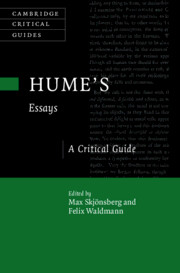Book contents
- Hume’s Essays
- Cambridge Critical Guides
- Hume’s Essays
- Copyright page
- Dedication
- Contents
- Figures
- Contributors
- Acknowledgements
- Abbreviations
- Introduction
- Part I Reception
- Part II Philosophy
- Part III Politics
- Chapter 8 Reconstructing Oceana
- Chapter 9 ‘One of the Most Difficult Problems, That Can Be Met With’
- Chapter 10 Hume on Eloquence and the Failings of English Political Oratory
- Part IV Political Economy
- Bibliography
- Index
- Cambridge Critical Guides
Chapter 10 - Hume on Eloquence and the Failings of English Political Oratory
from Part III - Politics
Published online by Cambridge University Press: 02 January 2025
- Hume’s Essays
- Cambridge Critical Guides
- Hume’s Essays
- Copyright page
- Dedication
- Contents
- Figures
- Contributors
- Acknowledgements
- Abbreviations
- Introduction
- Part I Reception
- Part II Philosophy
- Part III Politics
- Chapter 8 Reconstructing Oceana
- Chapter 9 ‘One of the Most Difficult Problems, That Can Be Met With’
- Chapter 10 Hume on Eloquence and the Failings of English Political Oratory
- Part IV Political Economy
- Bibliography
- Index
- Cambridge Critical Guides
Summary
Hume’s ‘Of Eloquence’ – in which Hume implores English orators to imitate the sublime style of Demosthenes – has long puzzled readers, for two reasons. First, it is rare for Hume to present ancient examples as suitable for moderns to imitate, particularly where politics is concerned. Second, in the essay’s conclusion, Hume seems to backtrack by encouraging English speakers to give up on sublimity and introduce more order and method into their speeches instead, inviting the accusation of incoherence. In this chapter, I show how reading Hume’s essay through the lens of ancients and moderns is limiting and that a comparison between the political cultures of England and France was central to his analysis. For Hume, the lack of sublimity in Parliament was a specifically English problem with roots in the English national character. If the revival of classical eloquence that Hume desired looked unlikely to him, I argue, this was due less to the unsuitability of sublime speech to a modern society than to the peculiar place of Parliament in Britain’s mixed constitutional order. I also demonstrate that Hume’s closing call for more order and method in English speechmaking was consistent with his earlier endorsement of the sublime.
Keywords
- Type
- Chapter
- Information
- Hume's EssaysA Critical Guide, pp. 187 - 204Publisher: Cambridge University PressPrint publication year: 2025

